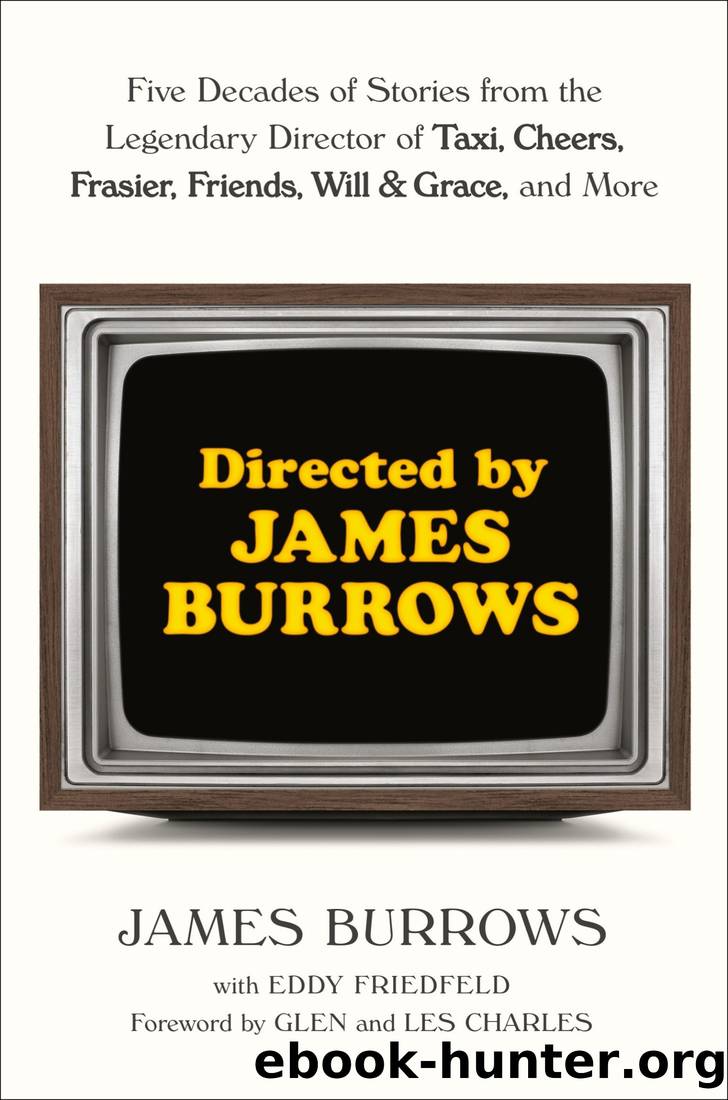Directed by James Burrows: Five Decades of Stories from the Legendary Director of Taxi, Cheers, Frasier, Friends, Will & Grace, and More by James Burrows & Eddy Friedfeld

Author:James Burrows & Eddy Friedfeld [Burrows, James & Friedfeld, Eddy]
Language: eng
Format: epub
Published: 2022-06-07T00:00:00+00:00
BOY
How about a beer, chief?
SAM
How about an ID?
BOY
An ID? Thatâs very flattering. Wait till I tell the missus.
SAM
(looks at the boyâs ID)
Ah, military ID. First Sergeant Walter Keller, born 1944. That makes you thirty-eight. Must have fought in Vietnam.
BOY
Oh, yeah.
SAM
What was it like?
BOY
Gross.
SAM
Yeah, thatâs what they say: âWar is gross.â Iâm sorry, soldier.
BOY
This is the thanks we get.
Instead of just throwing the kid out, Sam is gracious. It immediately shows the audience that heâs a decent man and a worthy center. Everyone likes Sam, in part because heâs got flaws and vulnerabilities. Heâs a recovering alcoholic. Heâs also a very compassionate person. The character and his point of view are crucial to the success of the show, because the audience sees this bar and all its wacky patrons through Samâs benevolence. The windows of the show are his eyes, his soul, and his passion for his bar and the people in it.
We could underplay the jokes because they were so good. Cheers looked effortless, because of the way it was played. Other than a few tough moments, like Sam and Diane arguing, it was always an understated show, which means we wanted the audience to figure it out. Like radio, where comedians competed with each other with just their voices, the subtlety was crucial to the show. Weâd undersell the joke so youâd have to meet us halfway.
That was attributable to Teddy Danson, whose best skill was that he could throw away a joke as part of another action, like pouring a beer. Thatâs the way a bar actually is. People have conversations. They donât scream or yell unless thereâs a problem.
Throwing away jokes is a particular style of comedy. The jokes become more like subtle comments. Henny Youngman didnât toss off comedy (Woman: Too late for the garbage? Garbage Man: No, maâam, jump right in). Chris Rock screams his comedy and youâre already on board. Dave Chappelle underplays his pieces; he waits for you to get on board. Steven Wright and Woody Allen never hit anything hard. That subtlety is as important now as it ever was, given the rise of comedy podcasts and new generations of audiences getting their laughs from people they are only listening to.
The best laughs Iâve ever directed were on peopleâs backs. A joke is often funnier if itâs said over someoneâs shoulder as theyâre leaving a room or under their breath. Not hitting it hard makes it funnier. On Mike & Molly, I directed jokes to be told to the hanging coats. That style works best in an ensemble. Kelsey as Frasier threw away jokes. Roseanne Barr threw jokes away; most of her show was underplaying. If you have a hard-hitting center, like John Lithgow, jokes are shot into outer space.
It helps if your center can do that, because the subsidiary characters canât. Rhea couldnât ever throw away a joke, because her jokes were too vitriolic. We thought of Carla as Groucho Marx, a sniper poised to insult. Her comedy was âsharking.â Whenever she appeared behind a character, Iâd tell Rhea, âShark in there.
Download
This site does not store any files on its server. We only index and link to content provided by other sites. Please contact the content providers to delete copyright contents if any and email us, we'll remove relevant links or contents immediately.
Kathy Andrews Collection by Kathy Andrews(11812)
The remains of the day by Kazuo Ishiguro(8981)
Spare by Prince Harry The Duke of Sussex(5181)
Paper Towns by Green John(5179)
The Body: A Guide for Occupants by Bill Bryson(5082)
Industrial Automation from Scratch: A hands-on guide to using sensors, actuators, PLCs, HMIs, and SCADA to automate industrial processes by Olushola Akande(5055)
Machine Learning at Scale with H2O by Gregory Keys | David Whiting(4296)
Be in a Treehouse by Pete Nelson(4038)
Never by Ken Follett(3937)
Harry Potter and the Goblet Of Fire by J.K. Rowling(3848)
Goodbye Paradise(3802)
The Remains of the Day by Kazuo Ishiguro(3398)
Into Thin Air by Jon Krakauer(3386)
Fairy Tale by Stephen King(3370)
The Cellar by Natasha Preston(3335)
The Genius of Japanese Carpentry by Azby Brown(3294)
120 Days of Sodom by Marquis de Sade(3264)
Reminders of Him: A Novel by Colleen Hoover(3096)
Drawing Shortcuts: Developing Quick Drawing Skills Using Today's Technology by Leggitt Jim(3075)
